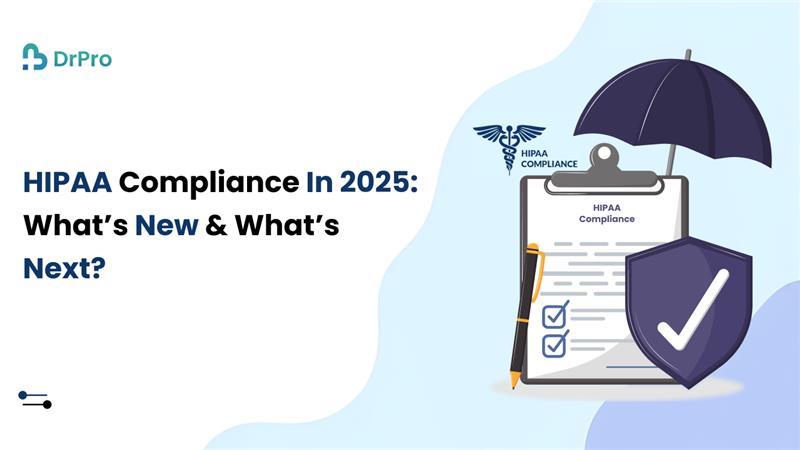Within this ever-changing healthcare world, with the emergence of technology, more apps, and services moving online, privacy and data protection have come to take utmost importance this is where HIPAA Compliance comes in. Its full form is Health Insurance Portability and Accountability Act; thus, it is a U.S. law that provides for the privacy of patient health information.
As 2025 comes in, there have been several updates made to the HIPAA rules to meet the developments in new technology and sharing methods. In this blog, we will explore what is new with 2025 HIPAA compliance, what healthcare entities should know, and what is still up for future consideration.
What is HIPAA Compliance?
HIPAA compliance is defined as adhering to the set of laws created under the umbrella of HIPAA legislation. These laws guarantee that entities working in the healthcare sector must ensure the safety and privacy of patient data. Covered entities (for example, clinics, hospitals, insurance providers) and business associates (like cloud providers and health-tech companies) must comply with the HIPAA rules.
HIPAA has three main rules:
- Privacy Rule – Protects personal health information (PHI).
- Security Rule – Requires physical, technical, and administrative safeguards for digital data (ePHI).
- Breach Notification Rule – Requires notification if data is lost or accessed by unauthorized persons.
Why HIPAA Compliance Still Matters in 2025
Present times are the perfect example of more than two decades of strong influence ever since the enactment of the law. With so much healthcare information being stored and shared in the digital environment, a data breach promises grave damages. Not just to gain some protection from the law, it is also HIPAA compliance that helps establish trust between the patient and the healthcare provider in 2025.
📲 Follow us on Facebook, Instagram, Twitter, App Store, IOS Store, LinkedIn & YouTube for more wellness tips!
What Is New in HIPAA Compliance in 2025
1. More Focus on Mobile and App Security
- Apps will need to encrypt all data at rest and in transit.
- User permissions must be stated clearly.
- Regular app security checks have to be carried out.
2. Faster Access to Patient Data
- Offering digital records to patients in a maximum period of 15 days (from the usual 30).
- Easy sharing with third-party platforms, on request from the patient.
3. Stronger Rules for Business Associates
- Third-party vendors must comply with all provisions of HIPAA.
- Direct penalty to partners for breaches.
- Mandatory cybersecurity clauses in contracts.
4. Tougher Cloud Security Rules
- Two-factor login is required if implemented.
- Threat detection software has to be used.
- Backup systems have to ensure no data loss.
Challenges in HIPAA Compliance
It is still not easy to remain compliant even with new updates.
- Cyberattacks are becoming more frequent.
- Vendor errors can place your data at risk.
- Employee errors do occur-e.g., an employee may mistakenly send data to an unauthorized person.
- Tech like AI and wearables is not always created with HIPAA in mind.
Tips to Stay Compliant with HIPAA in 2025
Have a method of training all employees on an ongoing basis about patient data handling.
- Encrypt every record of patients
- Ensure least privilege access to data only
- Monitor suspicious activities in system hacking or illegal misuse
- Have incident response plans ready for a data breach
- Use only vendors compliant with HIPAA
- Do audits at least yearly
What’s Coming Next?
- AI validation in the healthcare domain will become part of the HIPAA update.
- Wearable devices will have stronger controls for privacy.
- Cross-border regulations could be slightly more aligned with global data regulation.
- The bigger fines and penalties are expected to follow.
Conclusion
At DrPro, HIPAA compliance in 2025 is more critical than ever. The new rules are built to protect health data in a fast-moving digital world. Whether you run a clinic, develop health software, or manage hospital IT, you must stay alert, up-to-date, and fully prepared to meet the latest HIPAA rules.
HIPAA is not just a law; it’s a promise to your patients that their private health data is safe with you.
Frequently Asked Questions
Q1. What is the biggest change in HIPAA compliance in 2025?
Faster access to patient data (15 days), with tighter requirements for the mobile apps and the third-party providers.
Q2. Does HIPAA apply to mobile health apps?
Yes, these apps have to follow HIPAA in 2025, when such apps store or share health data for use by clinics or providers.
Q3. How can a small clinic keep itself HIPAA compliant?
To keep itself HIPAA-compliant, small clinics should encrypt data, restrict employees’ access, impose regular training programs on employees, and work only with HIPAA-compliant software vendors.
Q4. What happens during a HIPAA breach?
In the event of a breach, the provider must notify the patient, the Department of Health and Human Services (HHS), and possibly the media, depending on the size of the breach.
Q5. Do Cloud Solutions have to be HIPAA-compliant?
Yes. All cloud-based systems that store patient data need to comply with HIPAA privacy, security, and breach notification rules.


